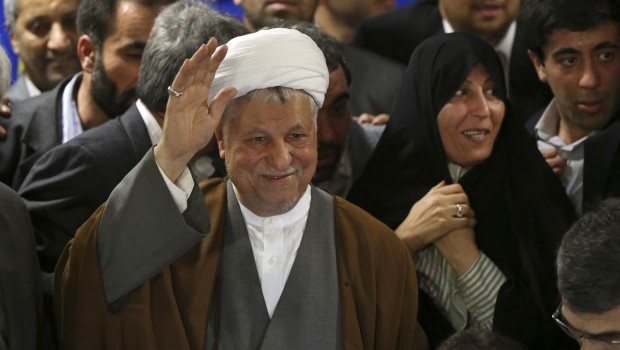Hashemi Rafsanjani is the most prominent veteran politician in Iran. But his experience has not made him so influential he can’t be touched: he was humiliated and harassed during Mahmoud Ahmadinejad’s presidency, when both his daughter and eldest son were imprisoned.
Still, Rafsanjani remains a voice of wisdom and consciousness in Iran. Although he is not in a powerful political position any longer, his opinion remains important within the Islamic Republic. Today, Iran is under the rule of the Islamic Revolutionary Guard Corps (IRGC), which has transformed from a force serving men of religion into a dominating army served by men of religion. Benefiting from Ahmadinejad’s policies, the IRGC expanded its authority and took over investment centers, oil companies and other security and military bodies.
With Hassan Rouhani’s election as president, Rafsanjani has become more comfortable in propagating his moderate views. Last week, for example, he called for close cooperation with Saudi Arabia to end regional tensions.
In light of the current situation in our region, Rafsanjani’s advice regarding reconciliation should be taken into consideration. His advice is important to anyone living in a region with more than 300 million inhabitants who are continuously suffering and threatened by permanent fears of wars and political violence. If you took a close look at the situation inside Iran, you would certainly not believe that Rafsanjani can influence a rabid leadership only interested in managing wars in the region. Iran today stands at the high-point of its intervention in the region’s battles.
Indeed, there are positive politicians like Rafsanjani, Khatami, and now Rouhani reaching the throne—but they remain without a scepter. The key decision-making positions, which can control the country’s policies, are in the hands of extremist elements.
Nevertheless, Rafsanjani’s call for reconciliation is not useless. It might help pessimists inside Iran understand the nature of their problems. As a country rich in natural resources and wonderful citizens, Iran suffers from one thing: its leadership’s policy of seeking Don Quixote-like confrontations, which it has followed ever since the eruption of the revolution. Iran is one of the few countries still closed to the world, even though dozens of extremist powers have abandoned their policies and adopted a reconciliatory approach, including countries that inspired the Iranian revolution like China and the Soviet Union, and countries like Vietnam that have suffered far more than Iran.
The Iranians have been besieged and living in poor conditions for 35 years. If Tehran decides to shift its political views toward more openness and offers to reconcile with the region’s countries, it will become a greater state, enjoying much more respect and influence in the region and the world. Turkey is one model to consider: it has far fewer resources than Iran, and yet it enjoys special state and citizenship status without being forced to send soldiers or spend financial resources on any regional wars, except when protecting its own borders.
Unlike the people of Turkey, Iranians have been suffering for more than three decades because of their leaders’ policies. Those leaders dream of regional dominance and support regimes and groups that do not mean anything to the Iranian people, like the Assad regime, Hezbollah in Lebanon, Hamas in Gaza, the Muslim Brotherhood in Egypt, Sudan’s dictator, Yemen’s Houthis and some rebels in the Gulf. Does any Iranian citizen see a benefit from supporting such groups? Of course not.
Rafsanjani’s decision to reconcile with Saudi Arabia is a wise one; doing so would benefit all parties and end the misery of millions of Syrians, Lebanese, Yemenis, Afghans, and others.
We believe that Iran, and not Saudi Arabia, should be responsible for this initiative, because the torch is in the Iranian leadership’s hands. I am confident that Saudi Arabia is ready to be a friendly country, and not just a neutral neighbor, to Iran. Rafsanjani once visited the kingdom and spent two weeks as a guest of the Custodian of the Two Holy Mosques. He moved around the country without any restrictions and met whomever he wished to meet. Nevertheless, despite this warm relationship, the problems between the two countries continued because the leadership in Tehran was not really interested in the reconciliation and misused the agreements signed during Rafsanjani’s term. It even used an airline bureau as an office for its activities.
The Iranian leadership can ignore Rafsanjani’s calls and thus miss out on the opportunity, but a day will come when the people will be fed up with this life of misery and of wasting their money on foreign regimes and parties—especially when the only results of such games benefit Iran’s leaders alone. The Shah also had this dream, but later on it became the nightmare that cost him his throne.

This is utmost stupidity thinking that the Iranian regime and its leaders are wise and want normal relations with Saudi or any other country…this is a trap to fool Saudi Arabia to take the pressure off the regime…be very careful…